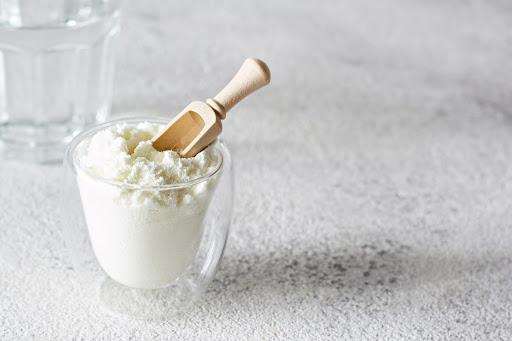As an active, health-conscious individual, you probably already have a pretty good diet. Having a balanced diet with plenty of fruits, vegetables, and greens is fantastic to eat well and stay healthy. But at the end of the day, are you getting enough protein? Protein is one of the building blocks of muscle, not to mention incredibly important for boosting your body’s metabolism. Although there are many means of supplementing the amount of protein you get in your diet, some of the simplest, most convenient methods are using protein powder. Because your health is the most precious thing you have, taking care of yourself is incredibly important as you get older. Protein powder can help. Here are five things to know about protein powder and supplements. Check it out below, and always remember, if you’re ever in doubt, be sure to consult your doctor for additional guidance and advice.
What Is Protein Powder?
Protein powder is a supplemental powder made from all-natural ingredients. The whole point of it is to help people stay fit and healthy. It’s used extensively by athletes and casual exercisers. But it’s also perfect for anyone looking for an easy way to increase their protein intake, lose weight, and gain muscle mass. Protein powder is a great source of energy, too, that happens to be low in fat and cholesterol-free. Protein powders are a great tool but are not a replacement for a healthy, well-balanced diet.
Why Should You Use It?
Although there are plenty of good reasons to incorporate more protein into your diet, there are few cases where using protein powders can be extremely helpful, depending on your health/fitness goals.
- Weight loss
- Muscle building
- Supplementing daily protein intake
- Recovering from injuries
- Boosting your metabolism
- Exercise recovery
- Burn more fat throughout the day
Using protein powder is a good way to reap all of these benefits and more. It’s always good practice to only use the recommended amount and never exceed your recommended protein intake for the day. The body should receive around 10 – 25% of its total calories from protein, and exceeding that amount can lead to higher lipid amounts in the blood. While protein supplements offer some great benefits, it’s always prudent to consult a dietician before taking any extra protein.
Types of Protein Powder and Supplements
Getting into protein powders can certainly seem daunting at first. With so many options, how do you know what to get? It helps if you understand the different types of protein powders and supplements that are out there on the market. Protein supplements can be as simple as a protein bar, shake, or premixed powder. One of the most popular protein powders is whey, but they also come as protein matrices and are plant-based as well. Remember that a supplemental protein powder (or supplement) that fits into your lifestyle and diet will help you make the most of your muscle-building efforts and help with your protein intake throughout the day.
Choosing A Protein Powder
When it comes to choosing a protein powder, you have to look at all the amazing options available. Assess your own fitness goals. Think about your health needs and general tastes. Are you lactose intolerant? Do you have any special dietary considerations? Be thorough in your self-assessment. If you’re looking for a quick and easy way to increase your daily protein intake, then whey protein powder might be your best possible option. Whey is fantastic because it’s delicious and comes in unique flavors. If you love chocolate, peanut butter, or vanilla, you won’t be disappointed. More importantly, whey protein is sometimes the best option due to how fast your body can absorb it. It’s the ideal workout recovery substance (just ask anyone who reads Men’s Health magazine) to be the best option for you. If you’re looking for a plant-based alternative, hemp or pea protein powders are great, too. Why are they such good options? Simply because they can give you all the essential amino acids needed for muscle growth when mixed with other protein sources. They’re also high in fiber, so you’ll not only stay regular but also feel nice and full after eating them. Ultimately, it’s important to find a variety of delicious protein powders that will be ideal for your health, so do your research and due diligence to get the best one for your needs.
When To Use Protein Powder
Protein powder can be a blessing on some days, but there are times when it might be more practical to eat high-protein foods instead. A handful of nuts (such as almonds and cashews) can be a magnificent healthy, quick energy snack. Some chocolate milk or a wedge of your favorite cheese can work wonderfully for an afternoon pick-me-up. Using protein powder is probably the most beneficial when it’s consumed following a workout. To truly optimize your workout gains, it’s generally recommended to take protein supplements 15 minutes or so (but no later than an hour) after exercising. For other fitness goals—like losing weight or boosting your metabolism in general—eating several high-protein snacks throughout the day is generally accepted as a way to help you consume fewer calories. At the heart of it all lies your health, fitness, and wellness goals. These will primarily influence when you use protein and whether it’s as a powder or other type of supplement.
 Being Human
Being Human




